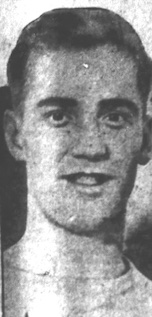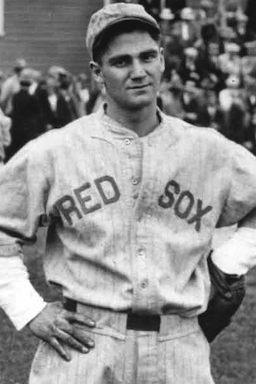
Sport: Baseball
Born: November 18, 1910
Died: March 30, 1983
Town: Atlantic City, New Jersey
Joseph Cicero was born November 18, 1910 in Atlantic City, NJ. The boy nicknamed “Dody” was the most gifted all-around athlete anyone in Atlantic City could remember, becoming the instant star of any team he joined and the champion of any individual sport he tried. Joe had the additional celebrity of being related to Clark Gable—an obscure silent-film actor who would one day become America’s most famous leading man.
As a seventh grader, Joe was invited to play on the Holy Spirit High School baseball team at the age of 12. He later pitched the school’s first no-hitter. Though he stood only 5’8”, he was strong and fast enough to lead Holy Spirit to undefeated football seasons in 1924 and 1925. Joe was also an elite-level athlete in basketball, bowling, billiards, swimming and diving. He and his older brother, Lawrence, formed Holy Spirit’s battery for several seasons.
No longer challenged by prep competition, Joe signed to play with the Easton Farmers of the Class-D Eastern Shore League in 1927 at the age of 16. So as not to jeopardize his amateur standing, he only accepted meal and expense money. He played shortstop for the Farmers and batted .329 and clubbed 13 homers in 62 games—more than three times more than any of his older teammates. He called himself Joe Doughty, using his old nickname as an alias.
Connie Mack had a network of bird dogs in Maryland, where the Farmers played, and Joe quickly came to his attention. Mack made an intriguing offer to Joe, who was too young to sign at 16. The A’s skipper said he would finance the rest of his education at Stanton Military Academy in Virginia, which had a first-rate baseball team, and the at Holy Cross College. Then, Joe would sign with A’s. Uncomfortable being indebted to Mack, Joe declined and waited until he turned 17 to sign a contract with the Boston Red Sox, where he felt he would have a better chance to play. He picked the Bosox over the A’s and Yankees. He spent the 1928 season with Salem and hit .285 as the everyday shortstop for player-manager Stuffy McInnis.
That fall, Joe suited up for the semipro Atlantic City Tornadoes football team. He scored a touchdown in a non-league game against the New York Giants and continued to play football on and off in Atlantic City into the 1940s.
Baseball was Joe’s first love, and he showed why as an outfielder for Class-A Pittsfield in 1929. Joe batted .340 and clubbed 25 homers for a team that had more than a dozen future major leaguers on the roster. Near the end of the season, he got the call to Fenway and continued hitting well, turning in a .313 average in 32 at-bats at the age of 18—the youngest player in the majors that year.

The following spring, Joe broke camp with the Red Sox but failed to hit and was traded to Indianapolis. He didn’t realize it at the time, but Boston was notorious for shuffling through young players and discarding them as soon as they slumped. Had he taken Mack up on his offer, he would have been given time to develop.
Thus began a minor-league odyssey that would see Joe play for multiple teams throughout the Great Depression, while continuing to play semipro football and basketball between seasons. Joe was a .300 hitter most years with jackrabbit speed, but the raw power wasn’t there by the time he was in his 20s. At various times, his contract was controlled by the Reds, Braves, A’s, Dodgers and Phillies. Much of his career was spent on clubs in Pennsylvania and New York State, where “Little Joe” was a perennial a crowd favorite.
At the age of 30, after suffering an eye injury, Joe finally faced the fact that he would never return to the majors and quit baseball after another solid season playing for a team in Quebec. He continued suiting up for local teams in South Jersey and stayed sharp enough to become a person of interest when manpower shortages that accompanied World War II sent teams scouring the country for talent. Joe had actually enlisted in 1942, but his vision issue led to his release from the military. By this point he was wearing glasses, both on and off the field.
Joe received a call from Billy Meyer, the manager of the Newark Bears in 1944. He offered a contract and a chance to play in the Bronx and Joe accepted. An injury early in the season limited him to just a handful of games, but he had hit well in limited play. The following spring, he received a similar offer from his old friend Connie Mack, who invited him to spring training with the Philadelphia Athletics. Joe made the club as a reserve outfielder and saw action in a dozen games, primarily as a pinch-hitter. Alas, the old stroke just wasn’t there anymore, even against lower-quality wartime hurlers. The A’s cut Joe and he finished his pro career with the Minneapolis Millers that summer, batting a respectable .283 in 65 games.
In 1946, Joe took a job as a security guard with the Panama Canal Company. He worked in the Canal Zone and played winter ball in Panama through the 1950 season. He got into scouting, working for the Brooklyn Dodgers in the mid-1950s as their man in Central American, before eventually moving to Florida in the mid-1970s. His most significant signing was Clyde Parris, a great minor-league hitter who never got the call to go to Brooklyn.
In 1968, a poll was conducted to pick the all-time best all-around athlete in Atlantic County. Joe Cicero was an easy pick for #1. He passed away in 1983 in Clearwater, FL.